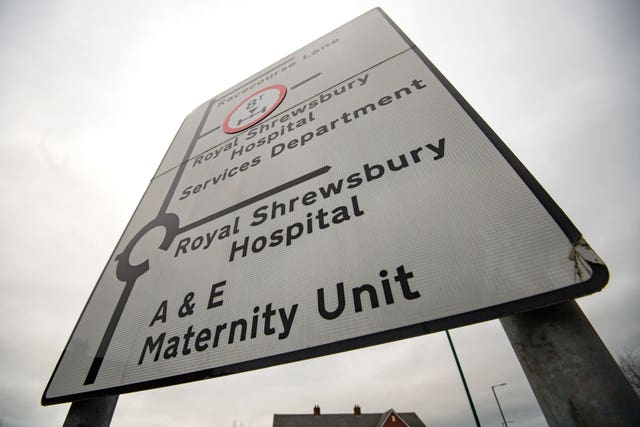The Ockenden report has raised 15 areas for “immediate and essential action” to improve care and safety in maternity services across England.
Areas such as safe staffing, escalation and accountability, clinical governance and robust support for families have all been included as “must dos” by maternity expert Donna Ockenden in the 234-page document.
The Shrewsbury and Telford Hospital NHS Trust have also been handed 60 local actions for learning, in light of care received by 1,486 families.
The report said maternity and neonatal services in England require a multi-year settlement from NHS England “to ensure the workforce is enable to deliver consistently safe” care.

It also says staffing levels across maternity services should be escalated to senior management when the agreed levels are not achieved.
Staff being able to escalate concerns and incident investigations being meaningful for families have both been described as essential action that needs to be taken across the country.
The report says staff who work together must train together, and should attend regular mandatory training.
It also states women who choose birth outside of hospital should receive accurate advice.
Appropriate bereavement care services should be put in place for mothers who suffer loss during pregnancy and clear pathways of care should be in place for provision of neonatal care, the report says.
The mental health and wellbeing of mothers also forms part of the essential action, with partners and families as “integral” to all aspects of maternity service provision.
The document indicates every trust should have a “patient safety specialist” dedicated to maternity services, and that all leaders are trained in human factors such as family engagement.
Language in investigation reports should also be easy to understand for families, the report says.
At a press conference on Wednesday morning, Ms Ockenden said: “It is absolutely clear that there is an urgent need for a robust and funded England-wide maternity workforce plan starting right now, without delay, and continuing over multiple years.
“This is essential to address the present and future requirements for midwives, obstetricians, anaesthetists, neonatal teams and equipment, and all the associated staff working in and around maternity services.
“Without this very significant multi-year investment, maternity services cannot provide safe and effective care for women and babies.”
Ms Ockenden said there needs to be a focus on addressing the issue of doctors and midwives leaving the workforce.
“Clearly if midwives and doctors continue to leave our maternity services and we do not improve working conditions for maternity teams, there is very little benefit in continually recruiting more staff,” she said.
Ms Ockenden added: “Only with a robustly funded, well-staffed, and well-trained workforce can families and Government be able to expect consistent delivery of safe and compassionate maternity care locally and across England.”
Ms Ockenden said 1,592 clinical incidents involving mothers and babies were reviewed as part of the inquiry.
“We now know that this is a trust that failed to investigate, failed to learn and failed to improve.
“This resulted in tragedies and life-changing incidents for so many of our families,” she said.
Ms Ockenden said the final report spans the period from 2000 to 2019, but said she is “deeply concerned” that families continue to contact the review team in 2020 and 2021 raising concerns about the safety of maternity care they have received at the Shrewsbury and Telford Hospital NHS Trust.
“Some of these recent families contacted us with reports they wanted to share with us. We haven’t been able to include them fully within the review but what we have seen is that the themes within their reports seem to echo concerns we have previously seen during this review.
“Seeing these repeated themes is a cause for grave concern.
“It is clear that there are a number of areas of maternity care where the Shrewsbury and Telford Hospital NHS Trust still has significant learning to undertake,” she added.




Comments: Our rules
We want our comments to be a lively and valuable part of our community - a place where readers can debate and engage with the most important local issues. The ability to comment on our stories is a privilege, not a right, however, and that privilege may be withdrawn if it is abused or misused.
Please report any comments that break our rules.
Read the rules here